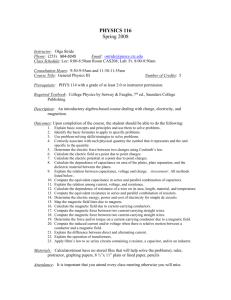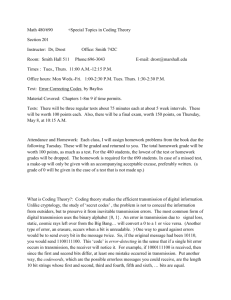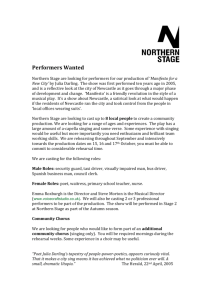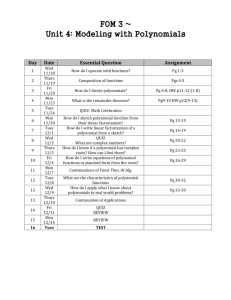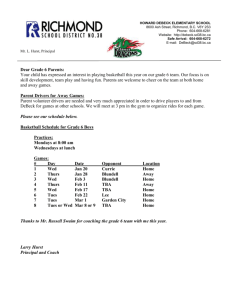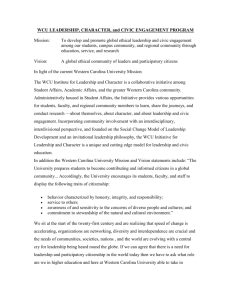World Literature: Texts In Context
advertisement
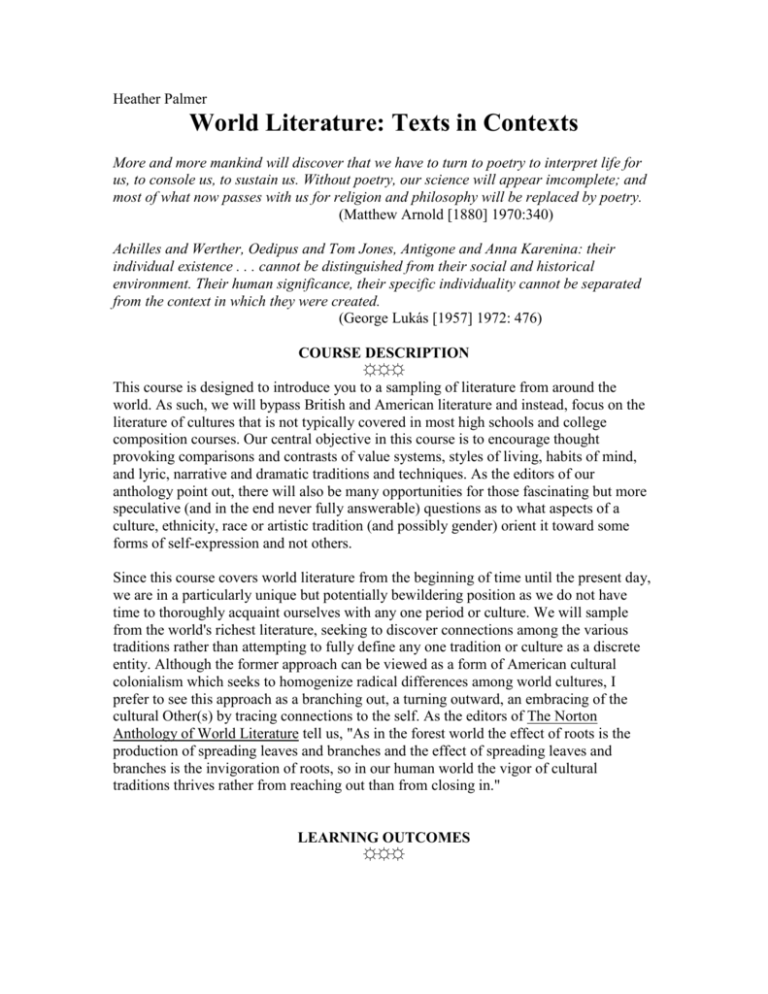
Heather Palmer World Literature: Texts in Contexts More and more mankind will discover that we have to turn to poetry to interpret life for us, to console us, to sustain us. Without poetry, our science will appear imcomplete; and most of what now passes with us for religion and philosophy will be replaced by poetry. (Matthew Arnold [1880] 1970:340) Achilles and Werther, Oedipus and Tom Jones, Antigone and Anna Karenina: their individual existence . . . cannot be distinguished from their social and historical environment. Their human significance, their specific individuality cannot be separated from the context in which they were created. (George Lukás [1957] 1972: 476) COURSE DESCRIPTION ☼☼☼ This course is designed to introduce you to a sampling of literature from around the world. As such, we will bypass British and American literature and instead, focus on the literature of cultures that is not typically covered in most high schools and college composition courses. Our central objective in this course is to encourage thought provoking comparisons and contrasts of value systems, styles of living, habits of mind, and lyric, narrative and dramatic traditions and techniques. As the editors of our anthology point out, there will also be many opportunities for those fascinating but more speculative (and in the end never fully answerable) questions as to what aspects of a culture, ethnicity, race or artistic tradition (and possibly gender) orient it toward some forms of self-expression and not others. Since this course covers world literature from the beginning of time until the present day, we are in a particularly unique but potentially bewildering position as we do not have time to thoroughly acquaint ourselves with any one period or culture. We will sample from the world's richest literature, seeking to discover connections among the various traditions rather than attempting to fully define any one tradition or culture as a discrete entity. Although the former approach can be viewed as a form of American cultural colonialism which seeks to homogenize radical differences among world cultures, I prefer to see this approach as a branching out, a turning outward, an embracing of the cultural Other(s) by tracing connections to the self. As the editors of The Norton Anthology of World Literature tell us, "As in the forest world the effect of roots is the production of spreading leaves and branches and the effect of spreading leaves and branches is the invigoration of roots, so in our human world the vigor of cultural traditions thrives rather from reaching out than from closing in." LEARNING OUTCOMES ☼☼☼ 2 Ability to read texts closely and to articulate the value of close reading in the study of literature and rhetoric. Ability to explicate texts written in a wide variety of forms, styles, structures, and modes. Ability to recognize and appreciate the importance of major literary genres, subgenres, and periods. Ability to respond imaginatively to the content and style of texts. Ability to write clearly, effectively, and imaginatively, and to adjust writing style appropriately to audience, content and subject. Ability to develop and carry out research projects and to articulate them within appropriate conceptual and methodological frameworks, including the ability to recognize when information is needed, and to locate, evaluate, organize, and incorporate information effectively. REQUIRED TEXTS The Norton Anthology of World Masterpieces (Expanded Edition, One Volume) Course Packet, available from professor Optional: A good dictionary of literary terms such as Chris Baldick's Concise Oxford Dictionary of Literary Terms. COURSE REQUIREMENTS AND GRADING Please read the attached sheet entitled “A Framework for Judging Grades.” Final drafts should follow the attached “Format for Acceptable Papers.” Papers are due at the beginning of class on the assigned due date. Late papers will be penalized one letter grade for each day they are late. Please note that under this system, a paper due on Monday but not submitted until Wednesday can receive a grade no higher than “C”, regardless of its quality. I will allow one rewrite of any paper that receives below a “C”, for a replacement grade not to exceed “C”. Be sure to discuss re-writes with me in advance. A student's final grade in this course is based on a 100 point scale and will be derived from the following assignments and tasks: Participation/In-class Responses: Oral Presentations (1): Written Responses(2): Mid-Term: Final: Final Paper: 15 points 10 points 10 points 20 points 20 points 25 points IN-CLASS ASSIGNMENTS 3 We will frequently be writing responses to the texts in class under time constraints. Therefore, anyone with an unexcused absence the day of these assignments will not be allowed to make them up. CLASS MEETINGS Because this course relies upon in-class writing, discussion, and group workshops for its success, you cannot pass the class without regular, productive attendance. You are expected to prepare for, attend, and participate in each of the class meetings; your “Participation and Preparation” grade is based on your in-class work. A large part of this grade will be based on a portfolio that will be turned in periodically throughout the semester. The final course grade will be reduced one (1) letter grade for each three (3) unexcused absences. Absences are excused only for athletes and band members on road trips, for students sufficiently ill to obtain a doctor’s excuse and for those with a death in the family. Athletes and band members know in advance when they must be out of town and must submit their written work in advance. PLAGIARISM Plagiarism is the submission of written work (words and/or ideas) which is not the student’s own, and which has not been properly acknowledged as belonging to another person. Evidence of plagiarism will result in automatic failure of the course. If you are unsure about what constitutes plagiarism, please speak with me BEFORE you submit your work. All assignments must be completed in order to pass the course SPECIAL NEEDS STUDENTS If you have a disability that may require assistance or accommodations, or if you have questions related to any accommodations for testing, note-takers, readers, etc., please speak with me as soon as possible. Bring a copy of your Student Accommodation form to the meeting. If you do not have an Accommodation Form but need accommodations, make an appointment with the Office of Disability Services (suite 230, New Student Center, extensions 3-9044) to arrange for accommodations. THE WRITING CENTER The Writing Center is located on the ninth floor of the General Classroom Building, room 976, phone: 404/651-2906. The staff there will help with any specific questions you may have about your papers before you turn them in, but they will not write your papers or proofread them for you. Take advantage of this resource. Go in on a walk in basis for a tutor, or sign up for a tutor to meet you individually on a weekly basis. SUPPORT SERVICES The CPS Office offers counseling and psychological services to students with personal, educational, or vocational problems. For more information, call 404/651-1777 ext 308. Campus Computer Locations: 109 Library South 404/651-2686, open 24 hrs on a space available basis; 200 Arts and Music Building, open on a space available basis from 8:00 4 am to 10:00 pm Monday-Thursday and 8:00 am to 5:00 pm on Friday; Alpharetta Center Microcomputer Lab 678/556-2200, open on a space available basis from 10:00 am to 10:00 pm Monday-Thursday and 10:00 am to 5:00 pm Friday and Saturday. COURSE SCHEDULE (DEVIATIONS WILL OCCUR) ☼☼☼ Week 1: Beginnings to 100 A.D: Invention of Writing and the Earliest Literatures. Jan 13 & 15 Tues: Introductions and Syllabus Thurs: The Greeks and the Formation of the Modern Mind Aristophanes (450-385 BCE) Lysistrata, 466 Week 2: Beginnings to 100 A.D.: Invention of Writing and the Earliest Literatures Jan 20 & 22 Tues: No Class Thurs: Euripides Meda Aristotle (384-322 BCE) Poetics, 520-526 Sign up for two oral presentations Week 3: Beginnings to 100 A.D: The Invention of Writing and Earliest Literatures Jan 27 Only Tues: Poetry and Thought in Early China and India Chuang Chou (369-286 BC), Discussion on Making All Things Equal, 555-566 The Bhagavad-Gita (Sanskrit, first century BCE) 612-626 Oral Presentation Thurs: No Class Week 4: The Roman Empire Feb 3 & 5 Tues: The Roman Empire Ovid (43 BCE-17 AD), The Metamorphoses, 683-696 Oral Presentation Begin Part II 100-1500 Thurs: From Roman Empire to Christian Europe The Bible: The New Testament (Greek, 1st Century), 708-721 Augustine (354-430), Confessions, 722-738 Oral Presentation Week 5: Part II 100-1500 AD Feb 10 & 12 Tues: The Rise of Islam and Islamic Literature The Koran (Arabic, 610-632) 868-888 The Thousand and One Nights (Arabic, 14th Century), 923-948 5 Oral Presentation Thurs: The Thousand and One Nights cont. Week 6:Part II 100-1500 A.D. Feb 17 & 19 Tues: Women Writers of the Early Middle Ages Marie de France (12th C) 996-1019 Julian of Norwich (14th C) course pack Christine de Pizan (15th C) course pack Margery Kempe (15th C) course pack Oral Presentation Thurs: Women Writers of the Middle Ages cont. Week 7: Part III 1500-1650 Feb 24 & 26 Tues: The Renaissance in Europe Miguel De Cervantes (1547-1616), Don Quixote, 1523-1621 Oral Presentation Wednesday: Don Quixote continued Oral Presentation Week 8: Part IV 1650-1800 March 2 & 4 Tues: The Enlightenment in Europe Voltaire (1694-1778), Candide, 2034-2102 Oral Presentation Hand out Mid-Term, due March 2 **Last day to drop with a “W” – Friday March 5** Thurs. Candide cont. Begin Part V 1800-1900 Week 9: Part V: 1800-1900 March 9 & 12 Spring Break Week 10: 1800- 1900 March 16 & 18 Tues: Revolution and Romanticism in Europe Rousseau (1712-1778), Confessions, Part I, 2148-2158 Symbolism Charles Baudelaire, (1821-1867), The Flowers of Evil 2420-2431 Lautreamont (1846-1870), Maldorer, course pack Oral Presentations Thurs: Realism and European Realities 6 Leo Tolstoy, (1828-1910), The Death of Ivan Ilyich, 2432-2475 Oral Presentations Week 11: Part V: 1800-1900 March 23 Only Tues: Realism and European Realities Begin Anton Chekov, (1860-1904), The Cherry Orchard 2537-2578 Thurs: No Class Week 12: Realism and European Realities March 30 & April 3 Tues. Chekov cont. Read course pack, Foucault, History of Sexuality Henrik Ibsen (1828-1906), Hedda Gabler, 2476-2536 Oral Presentations Thurs: Ibsen cont, Gustave Flaubert, (1821-1880), A Simple Heart Oral Presentations Week 13: Part VI: The Twentieth Century -- Self and Other in Global Context April 6 & 8 Tues: The World Today, a Western View; The World Today, an Eastern View Rabindrath Tagore (1861-1941), Punishment, 2618-2626 Oral Presentations Week 14: Part VI The Twentieth Century April 13 & 15 Tues: Modernism, Luigi Pirandello, (1867-1936), Six Characters in Search of an Author, 2627-2673 Oral Presentations Thurs: Franz Kafka, (1883-1924), The Metamorphosis, 2746-2783 Oral Presentations Week 15: The Twentieth Century April 20 & 22 Tues: Lu Xun (1881-1936), Diary of a Madman, 2723-2734 Oral Presentations Thurs. Borges (course pack) Week 16: The Twentieth Century April 27 & 29 Tues: Yukio Mishima (1925-1970), Patriotism, course packet 7 Thurs: Oral Presentations Individual Conferences Week 17: The Twentieth Century May 4 & 6 Tues: Proposals due - share with class Begin Chinua Achebe (1930-), Things Fall Apart, 2931-3030 Oral Presentations Thurs: Things Fall Apart cont. Oral Presentations Pass out final exam Final Exams and Papers Due 5/10 in my office 1026 Urban Life by 5:00 pm, or email with confirmation by 12:00 pm Format for Acceptable Papers 1. Essays should be typed or computer printed. Use white 8 1/2 x 11-inch paper. Don’t use onion skin or flimsy paper, off-colors, or off-sizes. 2. Set margins at 1 inch on the top and bottom, 1 1/4 inches on the left and right (this leaves enough room for my written comments). 3. Double-space the text of your paper. 4. Use a “running head” at the top right corner of each page except the first, consisting of your last name and the page number: (Jones 2, Jones 3, etc.) 5. DO NOT use a title page. Instead, in the upper left-hand corner of your first page, type a “name block” including the following information: Your Name The Course Title Heather. Palmer Date 8 6. Title your paper. “Paper #1” is not enough; your title should give some clear, specific indication of your topic and focus. Center the title on your first page, a few spaces below your name block. DO NOT underline or bold your title or put it in “quotation marks”. 7. Secure your pages with a paper clip or a staple in the upper left-hand corner. DO NOT simply fold the corner down or otherwise mutilate the paper. If possible, I prefer that you print your paper on both sides. 8. Any corrections should be made neatly and legibly in ink. Use white-out sparingly.


